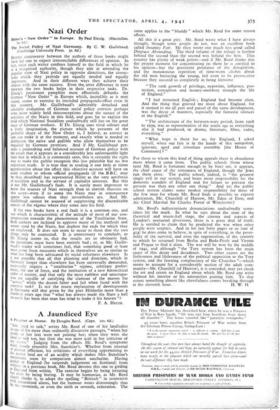A Jaundiced Eye
A Prophet at Home. By Douglas Reed. (Cape. rm. 6d.) "SHE liked to talk," writes Mr. Reed of one of his landladies in one of his more than ordinarily discursive passages, " when her inside or her feet were not paining her; when they were she liked to talk too? but, then she was most acid in' her criticism of nlY Views." Judging from the effects Mr. Reed's symptoms must closely resemble Mrs. Sunshine's. Whether from internal Or plantar affliction, his criticisms of everything appertaining to his native land are of an acidity which makes Mrs. Sunshine's sentiments seem by comparison almost saccharine. Having girded at England- (he suspends judgement on Scotland) from without in a previous book, Mr. Reed 'devotes this one to girding Engiand from within. The exercise begins by being irritating but ends by being boring. It may be humorous, as Mr. Reed Clearly thinks it, to adopt the spelling " Britisch " in connexion With naturalised aliens, but the humour wears distressingly thin . by the twentieth, or even the sixth or seventh, reiteration. The
same applies to the " bluddy " which Mr. Reed for some reason affects.
All this is a great pity. Mr. Reed wrote what I have always thought, though some people do not, was an excellent book called Insanity Fair. He then wrote one much less good called Disgrace Abounding. The third volume of the trilogy is further behind the second than the second was behind the first. This country has plenty of weak points—and if Mr. Reed thinks this the proper moment for concentrating on them he is entitled to his opinion—but the persistent petulance of the denigration, and the monotonous repetition of time-worn clichés about the old men betraying the young, fail even to be provocative because they succeed so completely in being tiresome.
" The rank growth of privilege, nepotism, influence, pro- tection, corruption and money-snobbery strangle the life of England."
" I had remained English ; England had become alien. And the thing that grieved me most about England, for it seemed to me all part and parcel of the same development, was the decay of manners, especially the fantastic silences of the English."
" The architecture of the between-wars period, from 1918 to 1939, was as representative of the senile age as everything else it had produced, in drama, literature, films, radio, everything."
" What hope is there for us, for England, I asked myself, when our fate is in the hands of this somnolent, ignorant, aged and irresolute assembly [the House of Commons] ?'" For those to whom this kind of thing appeals there is abundance more where it came from. The public schools (from whose taint Mr. Reed is fortunate enough to be free) are, it appears, the chief cause of the rottenness of England, though the Jews run them close. The public school, indeed, is " the greatest single evil in our system, and bears more responsibilty for the domestic scandals of England and for failure to prevent the present war than any other one thing." And yet the public school system claims some modest responsibility for three of the few men for whom Mr. Reed finds it possible to express admiration, Mr. Churchill of Harrow, Mr. Eden of Eton, and Air Chief Marshal Sir Charles Portal of Winchester?
Mr. Reed's indiscriminate denunciations undoubtedly some- times hit the mark. In what he says about the state of the theatrical and music-hall stage, the cinema and aspects of London's nocturnal diversions, there is a great deal of truth. He is entitled to claim that he predicted the war when other people were sceptics. And in his last forty pages or so (out of 414) he does come to believe, in spite of everything, in the possi- bility of the survival, and even the regeneration, of the country to which he returned from Berlin and Buda-Pesth and Vienna and Prague to find it alien. The war will be won by the middle of 1942, and although " the Tory system has been the main cause of this decay and decadence. Two other causes are the listlessness and lifelessness of the political opposition to the Tory system, and the fawning complacency of the Churches "—which seems to account for a considerable section of the adult com- munity—Mr. Churchill (of Harrow), it is conceded, may yet check the rot and create an England about which Mr. Reed can write without his interior or his extremities paining him. To that extent something almost like cheerfulness comes breaking through


























 Previous page
Previous page